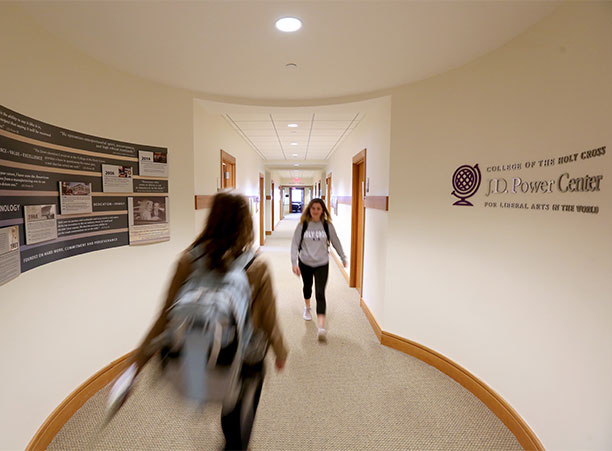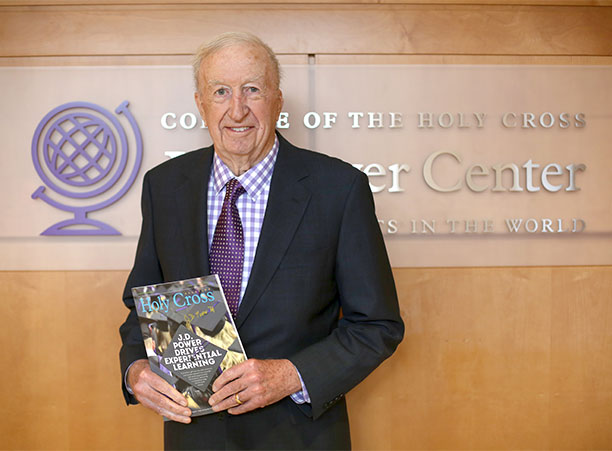
In 1965, McCulloch Motors engineered industrial-grade chainsaws — the choice of professional loggers — that were purported to last 200-plus hours in operation and that, unfortunately, nobody wanted to buy. Beleaguered, the company engaged Marplan Market Research consultant J.D. “Dave” Power III ’53, P93 to diagnose the problem. Power took the question to the customer and learned that most people only use a chainsaw once or twice a year; they wanted something light, simple, reliable and relatively quiet.
Power went before McCulloch executives and urged them to redesign their products with the customer in mind. The company listened. Then they offered Power a job.
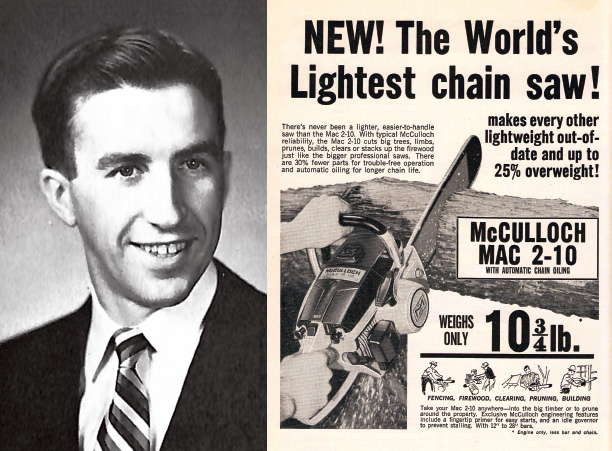 The Purple Patcher senior portrait of James David Power III ’53 (right). The ad for McCulloch chainsaws dated 1967 — two years after Power first met with McCulloch representatives — highlights what Power learned consumers wanted: a simple, lighter chainsaw.
The Purple Patcher senior portrait of James David Power III ’53 (right). The ad for McCulloch chainsaws dated 1967 — two years after Power first met with McCulloch representatives — highlights what Power learned consumers wanted: a simple, lighter chainsaw.A short time later, Power and his wife, Julie, founded the market research firm J.D. Power and Associates at the kitchen table in their home on Kenrose Circle in Calabasas, California. Over the next five decades, the company applied the lessons of the McCulloch study and developed a reputation for delivering thoughtful, independent insights that championed the voice of the customer. One of their most well-known influences has been on the auto industry, where Power helped an inward-looking industry transform into one that places customers at the pinnacle of importance. J.D. Power and Associates would come to embody principles that its founder honed as an undergraduate at Holy Cross: Listen, think critically and, when it’s time to speak, speak the truth.
In January 2018, the Power family’s Kenrose Kitchen Table Foundation gifted $3 million to Holy Cross to support the Center for Liberal Arts in the World, which since 2016 has provided students with experiential learning opportunities on and off campus. In recognition of the gift, the center has been renamed the J.D. Power Center for Liberal Arts in the World.
The gift will enable the College to enhance and significantly expand experiential learning, allowing students to integrate academics with opportunities — internships, student research, and community- and project-based learning — to apply their Holy Cross education in the real world.
While approximately 60 percent of Holy Cross students already participate in experiential learning, the foundation’s gift will accelerate the College’s efforts to increase and expand opportunities and engage all students in real-world experience that will enhance their liberal arts education.
“We grew up being instilled with the values of the Jesuit education, that classical education, and the importance of the liberal arts,” says Jamey Power, Power’s eldest son and former senior vice president at J.D. Power and Associates. “It’s so deeply woven into who we are and also into the company.”
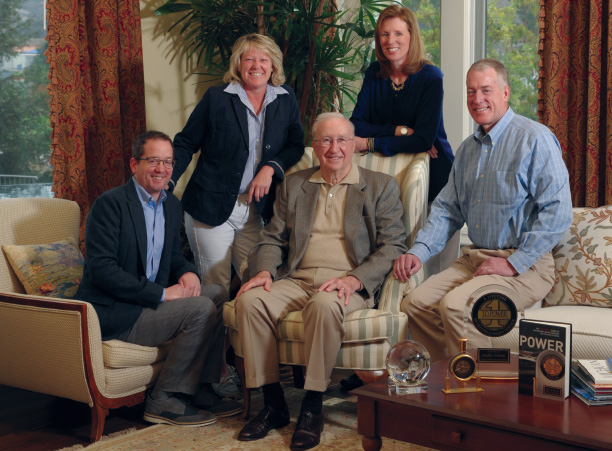 J.D. “Dave” Power III ’53 (center) and family, (left to right) Jonathan Power, Mary Power, Susan (Power) Curtin ’93 and Jamey Power. Photo by Charles David Photography
J.D. “Dave” Power III ’53 (center) and family, (left to right) Jonathan Power, Mary Power, Susan (Power) Curtin ’93 and Jamey Power. Photo by Charles David Photography“We’re always thrilled and amazed and very proud of what Holy Cross students, graduates and alumni are, how they think and how they present themselves,” adds daughter Susan Power Curtin ’93. “Look not just at our father’s career and vision and how he carried his education through, but at other alums, as well. Time and time again, you get to know these people that go on to do great things and become leaders in their industries. I think part of the motivation for this gift was to get that story out there: There is a case for the liberal arts, and we can help complement that with the center.”
Margaret Freije, provost and dean of the College, articulates a simple vision: “Any student can go from any major to any career.” Holy Cross, she says, has long nurtured the sort of critical thinking that gives students an advantage in the workplace. However, employers now demand graduates who can do the job from day one. In response, she wanted to create programs that would provide practical capabilities to supplement the liberal arts curriculum and drew inspiration from the College’s Health Professions Advising Office.
“Health — premed — is not a major,” Freije notes. At Holy Cross, students take a series of prerequisite courses. They’re guided toward internships or lab work to supplement academics with experiences, and throughout the process they receive mentorship from advisors, many of whom work in the industry. Premed students can select any major and still finish with the credits and experience needed for admission into medical school. In fact, over the past decade, more than 80 percent of Holy Cross graduates who apply get into at least one medical school each year, twice the national average.
“That’s the model that I want to try to expand,” Freije says. “Students should be able to select any major, supplement that major with an internship or other applied experiences and mentoring from professionals on and off campus in order to prepare themselves to be successful in whatever they are called to do in the world.”
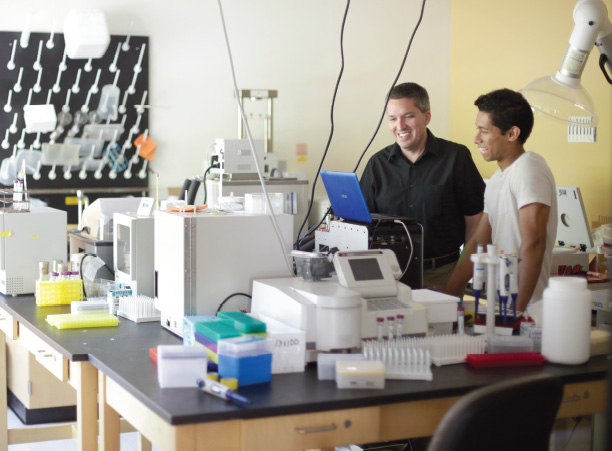 Christian Ramsoomair '18 works with chemistry Professor Ken Mills on "Influence of Pressure on Pab and Pho Splicing and Cleavage Capabilities." Photo by Tom Rettig
Christian Ramsoomair '18 works with chemistry Professor Ken Mills on "Influence of Pressure on Pab and Pho Splicing and Cleavage Capabilities." Photo by Tom RettigThis led to the 2016 creation of the Center for Liberal Arts in the World, which drew together the College’s existing experiential learning opportunities under one umbrella. The following year, Freije appointed political science Professor Daniel Klinghard as director to help the College realize her vision.
The newly renamed J.D. Power Center for Liberal Arts in the World now comprises a series of avenues students can pursue:
- The Washington and New York Semester programs, for which students complete academic internships and significant thesis projects
- The Weiss Summer Research Program, offering undergraduate summer research opportunities in a variety of disciplines
- The Donelan Office of Community-Based Learning, which connects academic classes with service opportunities in the Worcester area
- Trial teams, including the Mock Trial and Mediation teams, supported by a generous endowment from Agnes Williams, and the Hon. Joseph F. Greene Jr. ’51, P81, 84 Moot Court Program, for students interested in developing reasoning and debate skills
- The newly formed Ignite Fund, which awards grants for entrepreneurial student projects designed to provide solutions to real-world problems
“I think our dad’s history — the breadth of experiential learning he had growing up in Worcester, from his paper route to working as a contractor digging ditches for electrical lines — all those experiences add up,” Curtin notes. “The hands-on opportunities outside the classroom complement the academic experience and are now an expectation of an undergraduate program.”
“We’re constantly asking students to think about how what they’re learning in the classroom is actually experienced in the real world and then to bring that real-world experience back into the classroom,” Klinghard says.
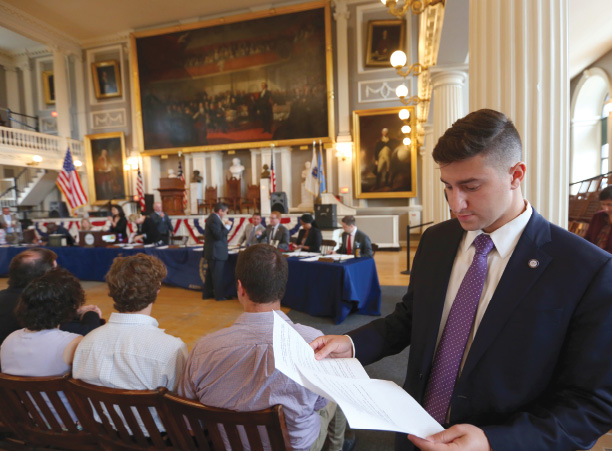 Peter Favorito '20 interns for Boston City Councilor Matt O’Malley at Boston City Hall. Photo by Tom Rettig
Peter Favorito '20 interns for Boston City Councilor Matt O’Malley at Boston City Hall. Photo by Tom RettigFor example, internships in Washington, D.C., and New York City are supplemented with weekly academic seminars that examine the day-to-day working environment through relevant scholarship. Community-Based Learning programs begin as early as first year and connect academics to civic engagement through student service in city organizations such as the Refugee and Immigrant Assistance Center and Worcester Public Schools Adult Learning Center. And the Ignite Fund provides resources for student-designed, student-implemented projects that put classroom knowledge into action by doing good work for and in the world.
Every J.D. Power Center program is designed to reinforce the Ignatian pedagogy that is the backbone of a Holy Cross education. The end goal, according to Klinghard, is to get students to think about how to create lives of personal and professional impact.
“You start with the experience that students have had,” Klinghard says. “You get them to reflect on that experience and from that reflection, make the choice of the best course of action to take next, which leads to the next experience.”
While nearly two-thirds of Holy Cross students participated in at least one program offered through the J.D. Power Center this year, Klinghard wants to see this figure increase. He envisions a scaffolding effect: Students try programs early and often, talk about their work, present research, and engage with classmates and roommates, then more students participate. The cycle perpetuates, resulting in graduates who are fully ready to realize their potential in their careers and lives.
Freije says graduates will be empowered by a “confident humility.” She wants to send students out into the world understanding “what they’re capable of doing, while still acknowledging that there’s more to know, there’s more to do, there’s more to learn,” she notes.
In many ways, the J.D. Power Center encourages students to embrace the example of its namesake.
“The center seemed like a really natural and great way for us to honor our parents’ legacy,” Curtin says. “Both our father and mother were the founders of this company, and we’re obviously very proud of the brand and how the name really stands for quality and integrity. We saw an exponential opportunity here, where naming this center would hopefully not just impact current and future students, but also help enhance the visibility of the programming for the College.”
“J.D. Power’s story is perfect for what we’re trying to do,” Klinghard says. “It really captures a lot of what we’re trying to instill in students: Trust your expertise, be entrepreneurial, try to live a life of integrity, try to speak for those who can’t.”
Learn more about the J.D. Power Center for Liberal Arts in the World and its dynamic offerings below:
https://www.youtube.com/watch?v=F8VYYSPXfHI
Written by Christopher Amenta ‘06 for the Spring 2018 issue of Holy Cross Magazine.
About Holy Cross Magazine
Holy Cross Magazine (HCM) is the quarterly alumni publication of the College of the Holy Cross. The award-winning publication is mailed to alumni and friends of the College and includes intriguing profiles, make-you-think features, alumni news, exclusive photos and more. Visit magazine.holycross.edu/about to contact HCM, submit alumni class notes, milestones, or letters to the editor.
Related Information
- Learning by Doing: Experiential Learning a Key Part of the Holy Cross Experience
- Students Find Alumni and Experience Through Washington, D.C. and New York Semester Programs
- Trial Teams Deliver Professional Competitive Advantage in All Fields
- Hitting the Right Notes: Nate Chung ’18 Segues from the U.S. Senate to Pop Musician to Consultant
